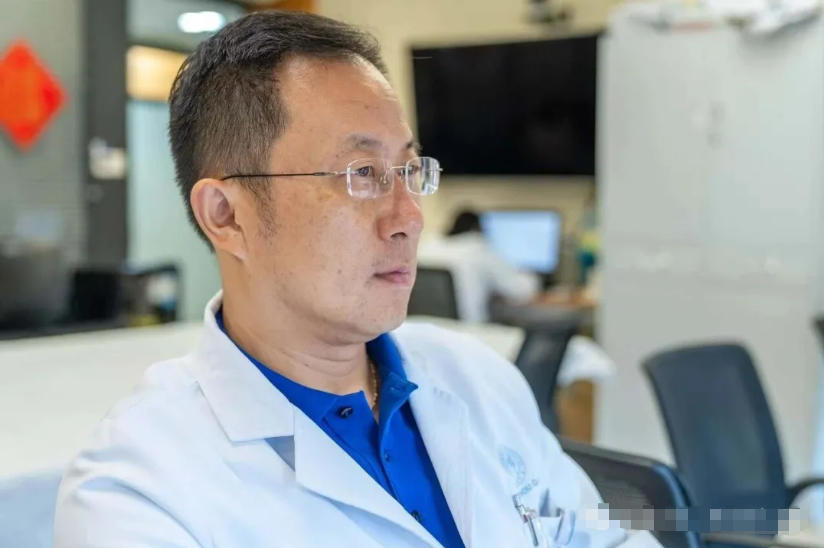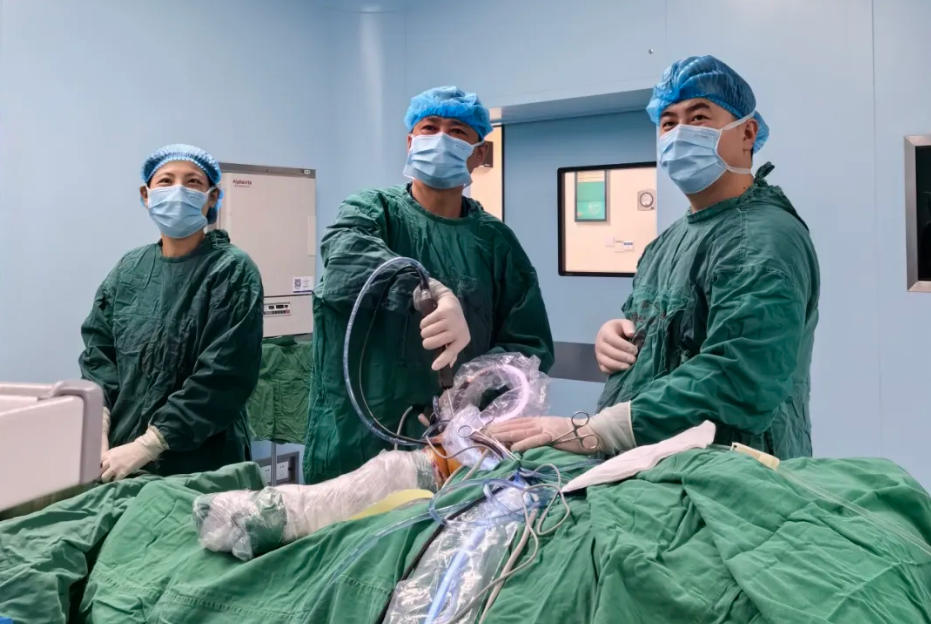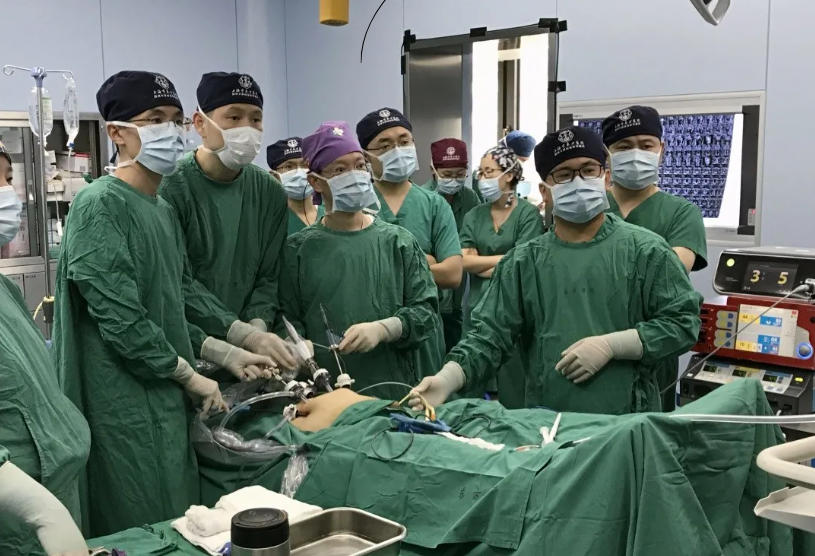Update time:2018-05-25Visits:10832
Dr. Liu Guangyu
The Essence and Redemption of Medicine

Dr. Liu Guangyu, a Chief Physician in the Department of Breast Surgery at the Cancer Hospital Affiliated to Fudan University and a Master's Supervisor.
Dr. Liu graduated from the seven-year clinical medicine program at Shanghai Medical College of Fudan University in 2000 and obtained a master's degree. In 2004, he received a doctorate degree from the Department of Clinical Oncology of Fudan University. He served as a visiting scholar at the University of Manitoma in Canada in 2002 and at the M.D. Anderson Cancer Center in the United States in 2006 respectively.
Since 2000, he has been working in the Department of Breast Surgery at the Cancer Hospital Affiliated to Fudan University. In 2007, he was approved as a Master's Supervisor. Currently, he holds the positions of Chief Physician, Deputy Administrative Director of the Department, and Secretary of the Party Branch.
He serves as a Standing Committee Member of the Breast Cancer Professional Committee and Deputy Chairman of the Youth Committee of the Chinese Anti-Cancer Association, a Member of the Clinical and Preventive Medicine Professional Committee of the Health Branch of the Chinese Medical Association, Deputy Chairman of the Breast Cancer Professional Committee of the Shanghai Anti-Cancer Association, etc.
"A doctor with a lamp burning in his heart and a deity residing within." When I showed him this comment plucked from thousands of patient reviews, he paused, startled, then smiled softly. "For those who choose this path," he said, "the heart must house a god—and that god is the patient."
Dr. Liu Guangyu, Deputy Administrative Director of the Breast Surgery Department at the Cancer Hospital, Chief Physician, and Master’s Supervisor, is a visiting scholar alumnus of the U.S.’s M.D. Anderson Cancer Center and Canada’s University of Manitoba. As a Standing Committee Member of the Chinese Anti-Cancer Association’s Breast Cancer Committee and Deputy Chair of its Youth Committee, he champions early breast cancer diagnosis, surgical precision, and interdisciplinary care. Yet his greatest skill lies not in the operating theater, but in the quiet art of connection.
"In oncology," he muses, "communication is no mere dialogue—it’s a crucible. Its triumphs rival the clarity of a flawless procedure." Indeed, his words have turned patients mid-journey, steering them toward life-saving surgeries, and coaxed fears from those moments from the scalpel, revealing desires to preserve their bodies. "True listening demands ears attuned to the unspoken," he explains. "For women weighingmastectomy or preservation, the choice is already inscribed in their souls. My role is to honor it—for breast cancer treatment is not just about excision. It’s about reconstructing identity, fostering resilience, and weaving hope into the fabric of survival."
He speaks of the invisible battles: the grief that gnaws at patients, deeper than the loss of a breast. "Death’s shadow is shaped by the bonds we forge—with doctors, families, and ourselves. I tell them: Nature writes each life’s final chapter. Dignity lies not in how we leave, but in how we’ve lived. Even in twilight, joy persists. Even when cure is beyond reach, hope remains."
In stolen moments between surgeries or flights, Liu turns to history. "If I could traverse time," he says, "I’d seek Emperor Renzong’s Northern Song court. No conqueror, he ruled with compassion—frugal, wise, and tender toward his people. His reign birthed poets, reformers, and thinkers whose legacy still lights our path."
I smile. "A benevolent ruler mirrors a benevolent healer—prudent, kind, and guided by a quiet reverence for life. The art of medicine, after all, is the art of humanity."

Guiding Lights in the Journey of Growth
Dr. Liu Guangyu was born in Shanghai in 1975 and he is the only doctor in his family. "Since I was a child, the elders in my family hoped that I could engage in technical work or some research work in the future. Later, when I was in high school, my grades were among the best in my grade. When it came to the college entrance examination, my family said that the major I filled in must be worthy of my scores. At that time, the scores required for studying medicine were high, so they suggested that I might as well become a doctor (smiles). That's how I entered the seven-year undergraduate and master's joint program in the Department of Clinical Medicine at Shanghai Medical University."
After graduating, he originally planned to start working as soon as possible. When Dr. Liu Guangyu told his decision to Professor Shen Zhenzhou and Professor Shao Zhimin - these two mentors with superb medical skills and great personal charm were the greatest benefactors and the brightest guiding lights in his life. The professors all strongly advised him to continue pursuing a doctorate degree. Finally, Professor Shen Zhenzhou even personally took him to the Department of Science, Education and Research to handle the application for an on-the-job doctorate. This matter made Dr. Liu Guangyu grateful for a lifetime.
In 2003, there was an episode. At that time, Dr. Liu Guangyu was serving as a visiting scholar in Canada with a subsidy from the International Union Against Cancer and was focused on completing an important scientific research project. However, when the deadline for returning to China arrived, the research work had not been completed. It was originally just a matter of extending the time of the overseas visit, but it happened to coincide with the time for his doctoral graduation. Caught between these two dilemmas, he was in a great predicament while being abroad. "Fortunately, these two teachers who cared about me intervened and communicated with the medical school on my behalf. They persuaded the school to extend the graduation time, and I was able to get through the crisis. It is precisely because of their care that I am who I am today." Dr. Liu Guangyu frankly admitted that these two esteemed teachers had given him great help on his growth path. They were both his benefactors and mentors. Their influence on him was integrated into his personality, moral character, medical ethics, from clinical practice to scientific research, from professional work to management, and he had benefited a great deal.
In fact, since his graduation internship in 1999, Dr. Liu Guangyu had already entered the Cancer Hospital. At that time, there was no Department of Breast Surgery. The breast surgery specialty was separated from the Department of Thoracic Surgery the following year, and a separate department was established. Dr. Liu Guangyu grew up along with the Department of Breast Surgery. "I still remember when I was a resident doctor, I had that kind of desperate drive to rush forward, with the determination that no one else could match. I strived to be the first in everything. I never stayed up late for studying or exams in college, but after I came to the Cancer Hospital, I started staying up late, and it was frequent. I especially cherished the time for night shifts. I would use the time on duty to do a lot of things in the hospital. The cultivation of enduring hardships came from the time beyond the eight-hour working day." Dr. Liu Guangyu said that when he was a junior doctor, he was always lacking in confidence and just wanted to keep improving himself. It was that hard-won opportunity to go abroad that gave him a chance to boost his confidence - it was the project in Canada before his doctoral graduation that helped him apply for his first project funded by the National Natural Science Foundation of China later. After returning to China, with the strong recommendation and support of his two teachers, he got to know many top experts in this field in China and served as an interpreter or secretary for foreign experts at some top-level forums and conferences. For young doctors, being able to attend certain high-level academic conferences, even just as an auditor, is a great pleasure. "There is another thing that has greatly changed my life. Shortly after I returned to China, Professor Shao and Professor Shen gave me a special task, which was to be in charge of establishing the Breast Diagnosis Department. I took it over without hesitation. Looking back now, it was one of the necessary trainings to become an excellent surgeon, like a candle illuminating the path."
The Breast Diagnosis Department that his two mentors entrusted Dr. Liu Guangyu to be in charge of at that time was the first breast localization biopsy diagnosis center in China, and there were a lot of pioneering work to be completed. Dr. Liu Guangyu, all by himself, along with a nurse, started the work. This could be regarded as his first major project after starting work. "That year, I can't remember clearly how many breast biopsy diagnosis operations I did. Although the operations were all seemingly trivial matters, and some doctors might look down on them, however, the experience I gained was not only the improvement of my professional ability, but also the ability in management and process design. These were all pioneering things. If I had missed them, I would have missed the beautiful scenery along the way." When Professor Shen Zhenzhou selected him to be in charge of the Breast Diagnosis Department, he said to him, "In the Department of Breast Surgery, there is no need to worry about not having the opportunity to perform surgeries. Don't be too eager to get on the operating table. Some things may seem slow, but in fact, they affect the speed later on." Dr. Liu Guangyu understood it perfectly. This period of experience enabled him to have a sharp eye in the diagnosis of early breast cancer.
Dr. Liu Guangyu's surgical technique also has distinct characteristics. He has followed the style of Professor Shen Zhenzhou, with clean and neat manipulation. He also has his own thoughts on a "perfect surgery". "Fast and slow are relative. At the right time, with the right frequency, going too far is as bad as not going far enough. For some surgeries, such as the reshaping and plastic surgery after a mastectomy, it simply can't be done quickly. Doctors need time to polish the work." DrLiu Guangyu has so many patients that he can no longer take on large-scale plastic surgeries. Instead, he is more willing to save the time for communicating with patients or doing some research work directly related to clinical practice. "Especially in communication, it requires a great deal of effort. Communication in the Department of Breast Surgery is very difficult, but it is extremely worthwhile."

"Over years in practice, the greatest lesson Breast Surgery has taught me is to read hearts. Beyond treating illnesses, we must step into patients’ minds. For breast cancer patients, whose struggles intersect with social and psychological dimensions, discerning their true intentions is the crux of healing. Effective communication rivals the precision of a masterful surgery," Dr. Liu Guangyu reflects.
As a breast surgeon, his role extends beyond physical symptoms to navigating the intimate stakes of a woman’s identity. "A breast embodies health, dignity, and relationships. The ‘battle’ betweenmastectomy and preservation often simmers for weeks. A skilled surgeon must first decode the whispers beneath words—the patient who insists on removal out of fear, or the one who clings to preservation with quiet resolve."
While extremes exist—patients adamant on either option—the majority teeter in uncertainty. "When someone says, ‘I’ll follow your advice,’ it’s rarely blind trust. They’re weighingmastectomy’s risks against the desire to preserve. Those fixated on ‘no recurrence after removal’ often hint at preservation longings, fearing their wishes might cloud our judgment. Yet our decisions never sway with patient preferences; they’re rooted in evidence, experience, and medical rigor. If a choice risks harm, I’ll never concede."
Dr. Liu Guangyu employs a deliberate strategy: for candidates eligible for preservation, he first presentsmastectomy, observing their reactions. "Some sink into silence. Minutes before surgery, I ask again—and the truth spills out. Rushing decisions denies patients the chance to imagine life after loss."
He underscores the psychological toll ofmastectomy: "For many, the absence of a breast becomes a lifelong shadow. A woman’s confidence, her sense of self—these are fragile. I once treated a patient obsessed with her prosthesis, adjusting it frantically in public restrooms. Such stories reinforce the growing urgency for breast preservation."
His philosophy redefines medical ethics: "True compassion isn’t just kindness; it’s piercing the veil of fear. When patients trust us enough to speak honestly, that’s the apex of communication. Amid millions, a patient’s choice to sit before me is a sacred bond. Building trust in moments demands artistry—and courage."
This commitment recently saved a 60-year-old patient. A biopsy indicated pre-cancer, but her daughter demanded discharge. "I suspected malignancy. Early-stage breast cancer is curable; letting her go would’ve been a failure." Liu risked a malpractice claim to persuade her. The result: in situ carcinoma. "Her family’s relief outweighed any gratitude. What matters is she’s alive. That’s my reward."
With a serene smile, he adds, "Medicine is both science and soulcraft. To heal, we must first listen—to the unspoken, the unspeakable, and the quiet courage of those we serve."
Restoration of the Interview

Professor Liu, could you please share your experiences and insights as a surgeon? Some people say that the older a surgeon gets, the more cautious they become when performing surgeries.
Thanks for your question. In fact, as I get older, I'm much bolder than I was when I was young. At least when it comes to dealing with certain complications, it's certain that the older I am and the more experience I have, the bolder I become. However, in some specific situations, we will be relatively conservative. For example, you have put a lot of effort into a patient, but the final result is not satisfactory. In such a case, we must definitely consider other options. For instance, we need to think about whether we can ask the radiotherapy department to provide treatment. From the perspective of the patient's benefits, if the surgery doesn't bring any advantages to the patient, but instead causes greater trauma and complications, then we must be conservative. This is not a matter of saving face.
ShanghaiDoctor.cn
ShanghaiDoctor.cn
ShanghaiDoctor.cn
ShanghaiDoctor.cn
I like reading history books. What I love reading most is the history of the heyday of the Tang and Song dynasties. The answer I hope to find from it is how to maintain a prosperous age. As the saying goes, it's easier to conquer a country than to keep it stable. The sun, the moon, the stars, and the changes throughout the ages all have their unshakable mysteries. And this historical period has left us with a great number of excellent cultural heritages, such as Tang poems and Song ci-poems. I love Li Bai and Su Shi more than other great poets and ci-poets of their eras. When one reaches middle age, one always prefers the eternal, beautiful, romantic and heroic feelings a bit more.

Interviewed by: Gong Zhiwei ShanghaiDoctor
Edited by: Qing Chen
If you'd like to contact to Dr.Liu Guangyu, Please contact us with chenqing@ShanghaiDoctor.cn.
Copyright This article is original and shall not be reprinted without authorization. If you need to reprint it, please leave a message in the background of [ShanghaiDoctor.cn, Ye Wen Ren Yi]. For authorized use, please indicate: "Source: [Ye Wen Ren Yi],ShanghaiDoctor.cn and the author." All copyrights of the articles belong to [Ye Wen Ren Yi],ShanghaiDoctor.cn and the author. Some of the pictures are sourced from the Internet. If there is any infringement, please contact us for deletion.
Dr. Zhou Qianjun | ““Sculpting Life in the Chest” – A Portrait” – A Portrait
Dr. Cai Junfeng | Guarding Bone and Joint Health, Improving Quality of Life
Dr. Xu Xiaosheng|The Gentle Resilience of a Male Gynecologist
Dr. Shi Hongyu | A Cardiologist with Precision and Compassion
Dr. Zhang Guiyun|The Inspiring Path of a Lifesaving Physician
Dr. Chen Bin | Building the Future of ENT Surgery at Lingang,Shanghai
Prof. Zhang Baigen | The Oral History of China’s Vascular Surgery

Dr. Zhou Qianjun | ““Sculpting Life in the Chest” – A Portrait” – A Portrait

Dr. Cai Junfeng | Guarding Bone and Joint Health, Improving Quality of Life

Dr. Cui Xingang | The Medical Dream of a Shanghai Urologist

Dr. Xu Xiaosheng|The Gentle Resilience of a Male Gynecologist

Dr. Shi Hongyu | A Cardiologist with Precision and Compassion

Dr. Zhang Guiyun|The Inspiring Path of a Lifesaving Physician

Dr. Jiang Hong | Bringing Hope to Vascular Frontiers

Dr. Huang Jia | A Journey of Healing "Breath"

Dr. Chen Bin | Building the Future of ENT Surgery at Lingang,Shanghai

Prof. Zhang Baigen | The Oral History of China’s Vascular Surgery